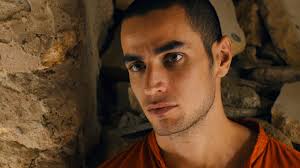Each year, the Academy of Motion Picture Arts and Sciences releases a shortlist of foreign language films that are eligible for an Academy Award. For more on how the process works, click here. In anticipation of that event, we will look at 2013’s nine shortlisted films. Go here for previous installments. This week is Palestine’s official selection, Omar.
Modern-day Palestine is filled with conspiracies, spies and secrets in the film Omar, directed by Hany Abu-Assad in the tense style of a Hollywood thriller.
Omar (Adam Bakri) is an idealistic young man who work as a baker in the West Bank. He regularly scales an Israeli-built boundary wall to visit his buddies, Tarek (Iyad Hoorani) and Amjad (Samer Bisharat). Omar is also sweet on Tarek’s teenage sister, Nadia (Leem Lubany). He dreams of marrying Nadia and leaving Palestine for glamorous locales like Paris and Mozambique.
Omar, Tarek and Amjad are part of a Palestinian resistance group. One night, they drive to an Israeli military camp where Amjad shoots a soldier. Tarek and Amjad escape, but Omar is captured. Under brutal torture, he is forced to make a terrible decision. Either he remains loyal to his friends, which means spending the rest of his life in prison, or he collaborates with the Israelis, which means he at least has a slim chance of marrying Nadia and escaping from his war-torn homeland.
The rest of the film plays out like a Palestinian version of The Bourne Identity. This film portrays the West Bank as a place of rampant paranoia where Omar can trust no one, not even Nadia. Omar attempts to stay one step ahead of his tormentors as the double-crosses and even the triple-crosses mount up with dizzying speed.
Omar is brilliantly directed by Abu-Assad in the style of a Hollywood thriller. He uses the alleyways and rooftops of the West Bank for a series of pulse-pounding chase sequences that are as good as any I have seen recent years. The film is also reminiscent of the social commentary films of the 1950s, particularly Elia Kazan’s masterpiece, On the Waterfront, starring Marlon Brando. Bakri is not an actor of Brando’s caliber, but his handsome face (featured in many close-ups) and his brooding intensity are reminiscent of Brando’s portrayal of union informant Terry Malloy.
The rest of the cast, many of whom are amateur actors, also do a fine job. The standout is Waleed Zuaiter as an Israeli spymaster who becomes almost a father figure to Omar. I know I’m beginning to sound like a broken record, but it really is a shame that the Academy ignores outstanding performances in foreign language films. Zuaiter deserved a best supporting actor nomination for his performance. He never hits a false note in a role that requires him to be both a tormentor and a mentor to Omar, while also being a real human being. At one point in the film he has to interrupt an interrogation to take a call from his nagging wife.
Omar was one of the five films on the official Oscar ballot, which is something of a surprise because it is a political film. (Israel’s official entry, Bethlehem, has a similar theme, but it was not shortlisted for an Oscar). Abu-Assad handles the tricky subject matter with great deftness ( He did an even better job at handling even more controversial subject matter in Palestine’s 2006 Oscar entry, Paradise Now, the story of a pair of suicide bombers).
Grade: A. This is a first-rate film about the lives of ordinary people who are caught up in one of the worst conflicts of modern times. This is the only one of the shortlised films that I have actively recommended to family and friends.
Omar is available on Netflix Instant.
I’ll take a Thanksgiving break next week, but I’ll be back on Dec. 5 with Two Lives from Germany.

